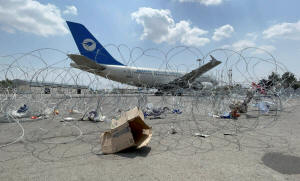With Kabul airport closed, fearful Afghans rush for the border
 Send a link to a friend
Send a link to a friend
 [September 01, 2021]
(Reuters) -Crowds looking to flee
Afghanistan flocked to its borders while long queues formed at banks on
Wednesday, as an administrative vacuum after the Taliban's takeover left
foreign donors unsure of how to respond to a looming humanitarian
crisis. [September 01, 2021]
(Reuters) -Crowds looking to flee
Afghanistan flocked to its borders while long queues formed at banks on
Wednesday, as an administrative vacuum after the Taliban's takeover left
foreign donors unsure of how to respond to a looming humanitarian
crisis.
The Islamist militia focused on keeping banks, hospitals and government
machinery running after the final withdrawal of U.S. forces on Monday
brought an end to a massive airlift of Afghans who had helped Western
nations during the 20-year war.
With Kabul's airport inoperable, private efforts to help Afghans fearful
of Taliban reprisals focused on arranging safe passage across the
land-locked nationís borders with Iran, Pakistan and central Asian
states.
At Torkham, a major border crossing with Pakistan just east of the
Khyber Pass, a Pakistani official said: "A large number of people are
waiting on the Afghanistan side for the opening of the gate."

Thousands also gathered at the Islam Qala post on the border with Iran,
witnesses said.
"I felt that being among Iranian security forces brought some kind of
relaxation for Afghans as they entered Iran, compared with the past,"
said one Afghan among a group of eight that crossed over.
More than 123,000 people were evacuated from Kabul in the U.S.-led
airlift after the Taliban seized the city in mid-August, but tens of
thousands of Afghans at risk remained behind.
Germany alone estimates that between 10,000 and 40,000 Afghan staff
still working for development organisations in Afghanistan have a right
to be evacuated to Germany if they feel endangered.
The Taliban is talking with Qatar and Turkey over how to run Kabul's
airport, according to French Foreign Minister Jean-Yves Le Drian, but it
could take days or weeks to finalise those negotiations.
Uzbekistan's land border with northern Afghanistan remained closed, but
its government said it would assist Afghans in transit to Germany by
air, once flights resume.
In a resolution on Monday, the U.N. Security Council urged the Taliban
to permit safe passage for those seeking to leave, but did not mention
the creation of a safe zone, a step backed by France and others.
The Taliban have declared an amnesty for all Afghans who worked with
foreign forces during the war that ousted them from power in 2001 for
their refusal to hand over al Qaeda leader Osama bin Laden after the
Sept. 11 attacks on the United States.

Taliban leaders have also called on Afghans to return home and help
rebuild, while promising to protect human rights, in an apparent bid to
present a more moderate face than their first regime, known for its
brutal enforcement of radical Islamic law.
The militia made similar promises upon seizing power in 1996, only to
publicly hang a former president, ban women from education and
employment, enforce strict dress codes and adopt a punitive approach to
the people of Kabul.
One woman said she saw Taliban fighters beating women with sticks
outside a bank in the Afghan capital on Tuesday.
"Itís the first time Iíve seen something like that and it really
frightened me," the 22-year-old said, on condition of anonymity, because
she feared for her safety.
[to top of second column]
|

A commercial airplane is seen at the Hamid Karzai International
Airport a day after U.S troops withdrawal in Kabul, Afghanistan
August 31, 2021. REUTERS/Stringer

NO NEW GOVERNMENT YET
The Taliban have yet to name a new government or reveal how they
intend to govern, unlike in 1996, when a leadership council was
formed within hours of taking the capital.
The foreign minister of neighbouring Pakistan, which has close ties
to the Taliban, said on Tuesday he expected Afghanistan to have a
new "consensus government" within days.
In the absence of a government in Kabul, Britain and India held
separate talks with Taliban officials in Doha, amid fears that up to
half a million Afghans could flee.
Washington said it would use its enormous leverage, including access
to the global marketplace, over the Taliban as it seeks to get the
remaining Americans and allies out of Afghanistan after its military
withdrew.
High on victory and back in power, some Taliban leaders mocked the
United States.
"Your power is gone, your gold is gone," Anas Haqqani, who has
emerged as one of the group's most prominent leaders, said on
Twitter.
Haqqani posted a photograph of himself holding discarded prison
shackles on Wednesday as he toured Bagram prison, where he spent
years kept in solitary confinement by U.S. forces.
Still, Afghanistan desperately needs money, and the Taliban are
unlikely to get swift access to the roughly $10 billion in assets
mostly held abroad by the Afghan central bank.

"If the international community wants to prevent an economic
collapse, one way would be to allow Afghanistan to gain limited and
monitored access to its reserves," Shah Mehrabi, an economics
professor at Montgomery College in Maryland who is on the board of
the central bank, told Reuters.
"Having no access will choke off the Afghan economy, and directly
hurt the Afghan people, with families pushed further into poverty."
Last week, the United States freed the way to continue the
humanitarian aid effort despite Washington's blacklisting of the
Taliban, a Treasury Department official told Reuters.
Pentagon spokesman John Kirby also said the United States was
mindful of the threat posed by ISIS-K, the Islamic State affiliate
that claimed responsibility for last week's suicide bombing outside
Kabul airport which killed 13 U.S. troops and scores of Afghan
civilians.
(Reporting by Reuters bureaus; Writing by Stephen Coates and Simon
Cameron-Moore; Editing by Clarence Fernandez)
[© 2021 Thomson Reuters. All rights
reserved.] Copyright 2021 Reuters. All rights reserved. This material may not be published,
broadcast, rewritten or redistributed.
Thompson Reuters is solely responsible for this content.
 |